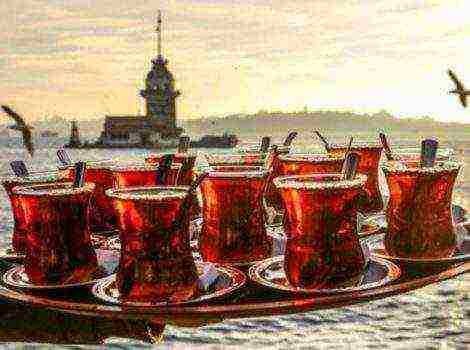Content
- 1 Description of the best varieties of strawberries
- 2 Vima Zanta
- 3 Gigantella
- 4 Diamond
- 5 Ducat
- 6 Kent
- 7 Clery
- 8 Queen Elizabeth II
- 9 Olbia
- 10 Honey
- 11 Elsanta
- 12 What types of strawberries are there?
- 12.1 Repairing strawberry varieties (with photos and descriptions)
- 12.2 Large species
- 12.2.1 1.Honey
- 12.2.2 2.Strawberry Lord
- 12.2.3 3.Gigantella
- 12.2.4 4.Maxim
- 12.2.5 5 the divine
- 12.2.6 6 Darselect
- 12.2.7 7.Festivalnaya
- 12.2.8 8 Chamora Turusi
- 12.2.9 9. Zenga Zengana
- 12.2.10 10 marshal
- 12.2.11 11 Victoria
- 12.2.12 12.Mashenka
- 12.2.13 13 Malvina
- 12.2.14 14.Kamarosa
- 12.2.15 15.Marmolada
- 12.2.16 16. Galya Chiv (civ)
- 12.2.17 17 sonata
- 12.3 Early varieties
- 12.4 Other varieties of berries
- 12.5 What are the best varieties to use for seedlings?
- 12.6 How to properly care for seedlings?
- 12.7 Which varieties are suitable for growing in a greenhouse?
- 13 The largest varieties of strawberries
- 14 Features of the Marshal variety
- 15 Conclusion
- 16 Video about planting large-fruited strawberries
It is impossible to choose the best strawberry variety according to the description. It is possible to evaluate and select varieties of any crop only if they are grown independently in the country. The description of the variety only helps to determine those characteristics that are most important for growing.
Clone selection
Strawberries, in comparison with fruit trees and ornamental shrubs, are much cheaper. Therefore, you do not need to buy many mustaches of the same variety, but purchase 3-5 plants of different varieties, the more there are, the better, but not less than 5 varieties. In the first year, you can evaluate the yield and quality of strawberries (of course, with proper agricultural technology), select the best 2-3 varieties and the best bushes within varieties and breed them on plantations. This method is called clone selection and prevents the degeneration of the variety.
Domestic varieties of strawberries are more resistant to diseases and pests precisely because clonal selection prevailed in Soviet agronomic science. In the West, varietal material was purified from viruses and diseases in laboratories; in the USSR, the best plants were selected in natural conditions. Therefore, after 2-3 years, many European varieties significantly lose their varietal qualities, diseases return to them quite easily, they need constant chemical treatments.
Domestic varieties are obtained from strawberry bushes with the highest immunity, which was manifested under normal growing conditions in the field. They retain their best varietal qualities for a long time.
Comparative characteristics of domestic and foreign varieties
To decide which varieties of strawberries to plant on your plot - domestic or European - you need to carefully study their main characteristics.
- Frost resistance. The best domestic strawberry varieties can withstand frosts down to -10 ° C without a snow cover, and under the snow they endure very harsh winters. European varieties can freeze severely in any winter.
- Winter hardiness.The ability to withstand not only frosts, but also winter thaws, without freezing, is much higher in domestic varieties.
- Taste. European varieties are sweeter.
Foreign strawberries yield good harvests in our country, but they are too tender for the Russian climate. Although it does not freeze completely, in the spring there are quite a few attacks on the plantation of the "Europeans".
Adult plants are more susceptible to freezing at unstable winter temperatures than young whiskers. In bushes that have yielded more than 2 harvests, the horns are significantly raised above the ground and for better wintering such plants are spud if there is no other covering material. But here, too, there are advantages: in a sparse planting, the yield is higher.
The best tastes are imported Pandora, Bounty and domestic Kokinskaya Zarya, Tsaritsa.
The best varieties in terms of yield are Kokinskaya Zarya, Mommy, Divnaya. But choosing according to yield is wrong. There are no low-yielding varieties in the modern assortment of strawberries.
Currently, breeders have developed many non-killing varieties that are resistant to a complex of damaging factors. These include: Kokinskaya Zarya, Mommy, Tsarina, Slavutich, Solovushka, Alpha, Izaura, Bereginya.
Description of the best varieties of strawberries
Strawberries produce one crop per season. In terms of ripening, strawberries are early, medium and late.
Early varieties
Early strawberry varieties bloom in mid-May; berries are harvested in mid-June. The yield of early varieties is 2 times less than that of later strawberries. This is a pattern
Alice
Description... The bushes are powerful, erect with a thin head of foliage, and consist of numerous rosettes.
Alice
The berries are regular, without a neck, blunt-conical, large, dark red, shiny, fragrant. The pulp is dense, dark red, sweet and sour taste. For cultivation in the North Caucasus region and in the Crimea.
- berry weight 16-25 g;
- the taste is excellent;
- the purpose is universal.
Advantages... Great dessert taste. Strawberries are suitable for transportation.
Flaws... Low winter hardiness. It is moderately affected by diseases.
Viola
Description... New Russian early strawberry variety. Sprawling bushes, thin foliage cap. The number of whiskers is average, they are pale red. Fruits are conical, red, without a neck, on thick, powerful stalks. The pulp is juicy, loose, red, sweet with sourness. For cultivation in the Volga-Vyatka region.
- yield 0.7 kg / m2 (170 g per bush);
- berry weight 17-20 g;
- the taste is excellent (4.9);
- content of substances; sugar 6.3%, acid 1.6%, ascorbic acid 69 mg /%;
- the purpose is universal.
Advantages... Excellent taste, high winter hardiness. Drought resistance is average. Strawberry mite resistant.
Flaws... Unsuitable for transportation and processing. Strawberries are for fresh consumption only. In rainy summers it is strongly affected by powdery mildew and gray mold.
Kokinskaya Zarya
Description... A very early strawberry, yields a harvest in early June. The pulp is tender, sweet and sour.
Kokinskaya Zarya
The berries are large, shiny, of good presentation. The first fruits are large, up to 30 g, the next 20-25 g. For cultivation in the Central Black Earth and southern regions.
- berry weight 25-30 g;
- the pulp is tender, juicy, soft;
- the taste is excellent;
- dessert appointment (for fresh consumption).
Advantages... Refers to non-kill varieties: resistant to fungal leaf diseases, strawberry mite. Drought-resistant, winter-hardy.
Flaws... Fruits are affected by gray mold. Unsuitable for transportation. To obtain a high yield, it requires high agricultural technology.
Mommy
Mommy
Description... A new promising non-killer variety. Bushes are vigorous, with medium leaves. Strawberries are bright red, large (first up to 38 g), the flesh is very dense, sweet, aromatic.
- yield 2.5-3.0 kg / m2 (250 g per bush);
- berry weight 22-30g;
- the taste is excellent;
- the purpose is universal.
Advantages... It is practically not affected by spider mites and strawberry mites, powdery mildew, leaf spots, verticilliasis. Very resistant to gray fruit rot, winter-hardy, grows well and bears fruit in any conditions. Suitable for long distance transportation. Today one of the best early varieties.
Flaws... The variety is being tested, no shortcomings have yet been identified.
Lambada
Lambada
Description of the variety... Nice old Dutch strawberry. Bushes are powerful, tall. The leaves are light green, very large, this is a characteristic feature of Lambada, by the leaves it is easy to recognize it among other varieties. The whiskers are numerous, are formed very actively, they are cut off every 3 days. The fruits are large, conical, red. The pulp is firm, sweet and sour.
- berry weight 20-25 g;
- the taste is excellent;
- the purpose is universal.
Advantages... Suitable for transport, resistant to fungal diseases, except for powdery mildew. Ultra-early, with warm spring, flowering begins in the second decade of May, berries appear in mid-June.
Flaws... It is affected by powdery mildew.
Medium varieties
Medium strawberries bloom in late May, bears fruit in late June.
Borovitskaya
Borovitskaya
Description... The bushes are powerful, erect, with many rosettes, the leaves are dark green. The first berries are very large (up to 30 g), the rest are smaller, regular, blunt-conical, without a neck. The color varies from bright red to orange-red, the flesh is light red, dense, aromatic, sweet and sour. For growing in the Volgo-Vyatka, Central Black Earth and Far Eastern regions.
- berry weight: the first 27-30 g, the next 18-25 g;
- good taste (4 points);
- substance content: sugar 7.2%, acid 1.4%, vitamin C 69.8 mg /%;
- the purpose is universal.
Advantages... Strawberries are drought and frost resistant, high disease resistance. Well transported over short distances.
Flaws... Average winter hardiness. There is a very large difference in the size of the first and subsequent berries.
Marvelous
Marvelous
Description... A Soviet variety, which was again included in the register 17 years after the collapse of the USSR, which confirms its high qualities. Strawberries are tall, compact, actively forming a mustache, which has a pale red color. The whiskers grow so quickly that they have to be torn off every 3 days for better fruiting. Fruits are very large, symmetrical, strongly elongated, no neck, light red, with shine. One of the best Soviet varieties for the North-West region.
- yield 1.49 kg / m2 (250 g per bush);
- berry weight 20-25 g;
- the taste is excellent sweet and sour;
- the pulp is dense with aroma;
- substance content: sugar 5.9%, acid 1.7%, ascorbic acid 44.5 mg /%;
- the purpose is universal.
Advantages... Strawberries tolerate winter thaws well and are drought tolerant. It is practically not affected by diseases, except for gray rot, the resistance to which is average. Berries are suitable for transportation.
Flaws... Not heat resistant and not suitable for southern areas.
Mashenka
Mashenka
Description... The newly revived Soviet strawberry variety Moscow Jubilee. The bushes are powerful, tall, the leaves are light green. The mustache is numerous. Fruiting is fast, the yield is highly dependent on the climate and agricultural technology. Fruits are very large, the first reaches 110 g folded (in a fan), mass collection - blunt-conical, weighing 60-90 g. Berries are dark red, very juicy, dense, without an inner cavity. A characteristic feature of the variety is the accretion of several berries.
- average yield, high in hot sunny summers;
- berry weight 70-90g;
- the taste is excellent;
Advantages... An excellent fruitful strawberry, resistant to diseases of the root system, very hardy and frost-resistant. Suitable for transportation.
Flaws... Due to the large size of the fruits, their number is reduced. The imbalance of the first berries, in a damp summer, is affected by gray rot.
Slavutich
Slavutich
Description of the variety... The bushes are medium, with a dense, dense foliage head. The formation is average, the mustache is pinkish-green. The berries are conical, red, shiny, without a neck. The pulp is dense, juicy, sweet and sour. Designed for cultivation in the Central and Middle Volga regions
- yield 1.16 kg / m2 (190 g per bush);
- berry weight 19 g;
- good taste (4);
- substance content: sugar 7.1%, acid 0.8%, vitamin C 63.4 mg /%;
- the purpose is universal.
Advantages... High resistance to everything that can threaten strawberries: rot, spot, strawberry mite, nematode. High frost resistance and winter hardiness. Strawberries practically do not freeze. Suitable for transportation.
Flaws... The taste is not very sweet, the berries lack sugar content.
Baby elephant
Baby elephant
Characteristics of the variety... The bushes are powerful, the whiskers form a little, they are pale pink in color. Fruits are large, ovoid, without a neck, the lower end is usually bifurcated, dark red with shine. Red pulp with aroma, sweet and sour taste. The first strawberry is large, the last one is small, uneven, asymmetrical. Recommended for cultivation in Western and Eastern Siberia.
- yield 0.8 kg / m2 (190 g per bush);
- berry weight 20-23 g;
- the taste is good;
- substance content: sugar 7.2%, acid 0.8%, vitamin C 88 mg /%;
Advantages... High winter hardiness.
Flaws... In rainy summers, strawberries are heavily affected by gray rot. Very picky about agricultural technology. With poor care, it gives small sour berries, the yield decreases.
Nightingale
Nightingale
Description... Bushes are tall, spherical. The first strawberry is extremely large - up to 50 g, the last - 15 g. Fruits are round-ovate, with a uniform red color. The pulp is dense, sweet and sour, aromatic. The variety is tested in different regions of Russia.
- berry weight 30-35 g;
- the purpose is universal.
Advantages... Non-kill variety. Resistant to diseases affecting strawberries, strawberry mites. Excellent winter hardiness and drought resistance. It tolerates transportation well.
Flaws... Not identified yet.
Torpedo
Torpedo
Characteristics of the variety... The bushes are medium, semi-spreading. The formation is average. The first berries are up to 40 g, the last - 10 g, regular shape, dark red. The pulp is dark red, firm, sweet and sour. The strawberry shape resembles a torpedo. For growing in the Volga-Vyatka region.
- yield 0.64 kg / m2 (190 g per bush);
- berry weight 20 g;
- the taste is excellent (4.6);
- substance content: sugar, 6.6%, acid 1.3%, vitamin C 65 mg /%;
- the purpose is universal.
Advantages... Suitable for transportation. It is resistant to strawberry mites and freezing.
Flaws... Insufficient resistance to gray mold.
Queen
Queen
Description... The bushes are small, the foliage cap is medium. The first fruits are very large - up to 50 g, mass collection 22-30 g, without a neck, with a wide rounded base, the color is dark red, almost burgundy. The pulp is red sweet and sour, juicy, dense, with aroma. Suitable for growing in the Central region.
- yield 1.15 kg / m2 (220 g per bush);
- berry weight 30 g;
- the taste is excellent (4.8);
- substance content: sugar 9%, acid 0.9%, vitamin C 76 mg /%;
- the purpose is universal.
Advantages... High drought and heat resistance. Good winter hardiness: without snow, it can withstand frosts down to -15 ° C practically without being damaged. Suitable for transportation.
Flaws... There is a very big difference in the size of the first and last berries.
Elsanta
Elsanta
Description... A Dutch strawberry variety developed in the early 1980s. Bushes of medium height, erect, forming a sufficient number of whiskers. The mustache is thick. The first berries are large, massively harvested - medium size, regular "strawberry" shape, no neck, shiny. The pulp is dense, juicy, red, sweet and sour taste with aroma. Designed for cultivation in the Volgo-Vyatka and North Caucasian regions.
- yield strongly depends on weather conditions, on average 0.6 kg / m2;
- berry weight 13-17 g;
- the taste is excellent (4.7);
- substance content: sugar 7.2%, acid 0.78%, ascorbic acid 75.3 mg /%;
- the appointment is dessert.
Advantages... High winter hardiness, stable fruiting. Suitable for transportation, can be stored without spoiling for up to 3 days in room conditions.
Flaws... It is not resistant to drought, and the yield is significantly influenced by weather conditions.
Late strawberry varieties
In late varieties, fruiting occurs in mid-July.
Alpha
Alpha
Description... One of the best late varieties of domestic selection for resistance to a complex of pests, diseases and unfavorable environmental factors. Suitable for those who make a lot of compotes, preserves, jam, etc. from strawberries. Bushes are medium, with dense foliage. The mustache is thick, pinkish-green. Berries of regular shape, red, shiny, no neck. The pulp is firm, sweet and sour, juicy with aroma.
- berry weight 15 g;
- satisfactory taste (3.8);
- substance content: sugar 5.9%, acid 1%, ascorbic acid 75 mg /%;
- technical purpose (for processing).
Advantages... Absolute resistance to anything that can threaten strawberries. Suitable for long distance transportation. The best grade for processing.
Flaws... The berries taste mediocre. They are not very large.
Bereginya
Bereginya
Description... The bushes are medium-sized with a very dense foliage head. They have a lot of mustaches of a pale red color. The first berries are large (25 g), mass harvest - 14-16 g. The shape is blunt-conical, the color is orange-red, which makes them seem immature, without a neck, with shine. The pulp is red, juicy with aroma, dense.
- berry weight 14.1 g;
- sweet and sour taste (4.5);
- substance content: sugar 5.7%, acid 0.8%, ascorbic acid 79 mg /%;
- dining destination.
Advantages... High heat and drought resistance. Good winter hardiness. Practically not affected by diseases and pests. One of the best varieties in terms of vitamin C content. It belongs to non-killer varieties.
Bounty
Bounty
Description... Canadian very late strawberry variety. The first berries are large (28-30 g), red, shiny, well aligned. The pulp is loose, juicy, sweet and sour, with a pleasant strawberry aroma, dark red. A distinctive feature of the variety is the superficial arrangement of achenes.
- berry weight 20 g;
- the taste is excellent;
- the appointment is dessert.
Advantages... Strawberries are large, undemanding to agricultural technology. High taste. Resistant to gray mold.
Flaws... Strongly affected by powdery mildew, sometimes even berries suffer.
Izaura
Izaura
Description... New high-yielding Belgian variety. Bushes are strong, compact, with dark green leaves. The formation is average. The sockets are strong, powerful. Fruits are large, bright red, round-ovate, glossy, well aligned. The pulp is juicy, sweet and sour.
- the taste is excellent;
- the appointment is dessert.
Advantages... Strawberries can grow on heavy clay soils, are resistant to adverse factors, diseases, unpretentious and undemanding to care for. Suitable for transportation.
Flaws... In our conditions, it is not winter-hardy and frost-hardy enough, although it tolerates not very cold winters with a small amount of thaws.
Carmen
Carmen
Description... The variety was developed in Czechoslovakia. Medium late. Bushes are powerful, tall, with dense dark green foliage. The first fruits are large - 35-40 g, the berries of the mass harvest are smaller (15-20 g). The pulp is dark red, juicy, dense. The taste is sweet and sour. Provides stable yields.
- berry weight 15-17 g;
- the purpose is universal.
Advantages... Good quality berries at a time when the main varieties of strawberries have already departed.
Flaws... Insufficient winter hardiness and drought resistance. There are many attacks in the spring.
Pandora
Pandora
Description... Quite an old English variety.The bushes are compact, with dense foliage, stand out on the plantation with their light green color. Usoobrazovanie moderate, in hot weather gives a little mustache. The berries are dark red; when fully ripe, they become dark cherry in color. The pulp is dark red, sweet and sour, juicy. The first fruits are flattened, weighing up to 40 g. The berries of the mass collection are rounded.
- berry weight 25-30 g;
- dessert taste;
Advantages... The best berry flavor of all late varieties. Large strawberries. Powdery mildew resistant. Flowers are not affected by spring frosts.
Flaws... Low winter hardiness, affected by gray rot and spots. For the winter, the bushes are covered.
A shelf
A shelf
Description... Dutch strawberry variety, characterized by very long fruiting - 4-6 weeks. The berries run out only by the end of July. By the end of fruiting, the chopping of the berries is insignificant. Strawberries are medium in size, with a neck, dark red, outwardly very attractive as in the picture. The pulp is juicy, sweet and sour, intense red, dense, with aroma. In dry summers, abundant watering is necessary.
- berry weight 19 g;
- the taste is excellent;
- the purpose is universal.
Advantages... The best strawberry for its taste. It is resistant to powdery mildew, tolerates rainy summers and excess moisture in the soil.
Flaws... Not hardy enough, not resistant to gray rot.
All modern strawberry varieties have a number of advantages that are revealed with proper care. If you imagine how much labor, time, effort was spent to breed a new variety, then you stop scolding varieties for imaginary or real shortcomings.
Looking for strawberries for your summer cottage? Then this is for you:
- Repaired strawberries. Only proven varieties
- Strawberry Elizabeth and Elizabeth 2 description and reviews. What is the difference between these varieties and which one to choose after all.
- Strawberries Gigantella Maxim. Consider whether to plant it.
- Strawberries Festivalnaya, reviews and recommendations for care. Unkillable Festivalnaya, why is she still loved by gardeners.
- Asia variety description. Capricious Asia, how to grow it.
- Lord variety description. An unpretentious and productive Lord.
- Honey Strawberry. Undemanding and productive variety, but more suitable for processing.
- Wima Kimberly: description and agricultural technology. A versatile strawberry loved by gardeners in all regions.
- Clery: a description of the variety, reviews and a brief agricultural technique. A strawberry that loves the sun very much.
- Strawberry Alba: description, reviews and agricultural technology. A very good variety for sale in the market.
- The varieties are weeds on the strawberry plantation. Where do they come from?
Save article to:
Dear visitors of the "Dacha Plot", tireless gardeners, gardeners and flower growers. We offer you to pass the aptitude test and find out whether you can trust the shovel and let you into the garden with it.
Test - "What kind of summer resident I am"
Share this article with your friends:
Here's a list of 10 proven garden strawberry varieties that won't disappoint you.
A good strawberry (garden strawberry) should bring a stable harvest, delight with aromatic fruits with excellent taste and not be afraid of pests and diseases. We have compiled a selection of just such varieties. Take note!
Vima Zanta
This early strawberry variety is a worthy example of Dutch selection. Vima Zanta gives a good harvest of large, beautiful berries with juicy sweet pulp and delicate aroma.
The only nuance that can stop the choice of this variety is the "capriciousness" of the crop during transportation. Berries can only survive the journey when chilled, so this variety is unlikely to suit you if you plan to grow strawberries for sale.
If, during fruiting, the mustache is not removed in time, which is formed in excess on the bushes of Vim Zanta, the berries will become smaller.
| Maturation | Berry weight (g) | Productivity (kg per bush) | Peculiarities |
| End of May - beginning of June | 40 | 0,6-0,8 | High permeation |
Gigantella
The name of this strawberry - Gigantella - speaks for itself. Its fruits can reach a record weight of 125 g! At the same time, the pulp is very juicy, but quite dense, sweet with light pineapple notes.
Unlike the previous variety, this one retains its shape during transport, so it can easily be grown commercially. Such a beauty will definitely find her buyer!
| Maturation | Berry weight (g) | Productivity (kg per bush) | Peculiarities |
| June | 60-125 | 1-3 | Good transportability |
Diamond
Diamant is an American garden strawberry that turns 20 next year. During this time, strawberries managed to win a considerable number of fans on both sides of the Atlantic.
Diamond fruits are of medium size, tasty, aromatic. The bushes are practically not susceptible to powdery mildew, spotting, verticillosis and root rot.
| Maturation | Berry weight (g) | Productivity (kg per bush) | Peculiarities |
| End of May - beginning of June | 20-40 | 1-2 | Resistant to diseases and viruses |
Ducat
This variety is not afraid of recurrent frosts. Unlike most varieties, Ducat bears fruit well even after a sudden cold snap. This variety is also notable for its excellent yield and excellent refined taste.
Berries can be eaten fresh or processed. With any culinary treatment, they retain their aroma.
| Maturation | Berry weight (g) | Productivity (kg per bush) | Peculiarities |
| End of May - beginning of June | 20-40 | 1-2 | Resistant to low temperatures |
Kent
The Canadian variety Kent is celebrating its 35th anniversary this year. This strawberry has proven itself well among gardeners. Of course, in terms of large-fruitedness, it cannot be compared with Gigantella, but, nevertheless, the Kent berries can be called quite weighty.
In addition, strawberries of this variety have an excellent dessert taste, are well stored and transported. In general, Kent can be called one of the most unpretentious varieties of garden strawberries.
| Maturation | Berry weight (g) | Productivity (kg per bush) | Peculiarities |
| First half of June | 40 |
0,7-1 |
Winter hardiness, resistance to powdery mildew and gray mold |
Clery
Strawberry Clery is an Italian beauty with a great sweet taste without a single sour note. The bushes of this variety rarely get sick, are quite resistant to fungal attack and rot, but still in the middle lane it is recommended to grow them under cover.
| Maturation | Berry weight (g) | Productivity (kg per bush) | Peculiarities |
| The beginning of June | 20-40 |
0,7-1 |
Resistance to fungus and root diseases |
Queen Elizabeth II
This variety is the absolute champion among strawberry varieties. This garden strawberry produces great fruits with a truly royal taste. The berries are sweet, a little honey. True, provided that you are harvesting a ripe crop. Unripe fruits can sour.
Queen Elizabeth II is a remontant variety that flowers and bears fruit from May to October. She doesn't even care about freezing. Don't hesitate to plant this variety in your garden!
| Maturation | Berry weight (g) | Productivity (kg per bush) | Peculiarities |
| Renovation (from May to October) | Up to 110 |
1-2 |
Resistant to most diseases and viruses |
Olbia
Ukrainian strawberry Olvia is a real beauty. Its fruits are large, glossy, regular in shape. Even if the yield of Olbia does not break records, the plants of this variety are not afraid of the vagaries of the weather - they are not afraid of either frost or drought.
| Maturation | Berry weight (g) | Productivity (kg per bush) | Peculiarities |
| Mid May - mid June | 30-40 |
0,6-0,7 |
Frost resistance, drought resistance |
Honey
Honey is one of the most popular garden strawberry varieties in its homeland in the United States. Our gardeners also like American strawberries. And this is not surprising, because Khonya has a lot of advantages. Firstly, it perfectly “rehabilitates” after recurrent frosts. Secondly, this strawberry is easy to care for. Thirdly, it is perfectly transported.
| Maturation | Berry weight (g) | Productivity (kg per bush) | Peculiarities |
| Mid May - mid June | 30-40 |
0,5-0,7 |
Frost resistance, good transportability |
Elsanta
Elsanta strawberries are best suited for growing under plastic cover, although they can also be planted outdoors if desired.
Plants of this variety do not have special requirements for feeding, in general they are resistant to common diseases and viruses. Elsanta fruits are large enough, beautiful, round in shape with a pleasant sweet taste. The berries are well transported, so the variety is suitable for growing for sale.
| Maturation | Berry weight (g) | Productivity (kg per bush) | Peculiarities |
| June | 40-50 | Needs good watering | |
Do you have any favorite varieties of garden strawberries? Share your impressions in the comments and on the forum.
New varieties of strawberries appear on the market for the sale of seedlings every year. Breeding requirements have different directions to meet the desires of professional and amateur gardeners. Someone likes a very sweet early berry. For others, transportability, late harvest times, resistance to diseases, and the appearance of pests are considered important. We will tell you what kinds of strawberries there are, a description of each type will be with photos and reviews of gardeners.
What types of strawberries are there?
Anyone can be found now. Test in a specific climate. Grow the selected type of berry in territories of any size. Let's consider the most "delicious" of them.
Repairing strawberry varieties (with photos and descriptions)
The ability of plants to rise again, bloom again, re-bear fruit in the current season is called remontance from fr. Remontant. In nature, a similar property of strawberries has been found among the Alpine meadows. The cultivation of garden forms of such plants was first begun in Italy. In the 16th century, the first remontant strawberry species were obtained by domestic breeders. Now many types of berries are known, which give an additional harvest, allowing you to see this tasty berry at home for almost a whole year. On a separate bush, many rosettes, inflorescences, are formed, yielding a crop. It is very often used to decorate the site in the fantasy ideas of gardeners, landscape designers, it is remontant strawberries. Its best varieties are:
1.Mara de Bois
The French "guest", which appeared in 1991, has conical berries of an orange hue on the outside, white on the inside. Plants are short with short peduncles. The bush has a small number of outlets. These varieties of berries withstand well the winter conditions characteristic of central Russia. Fruits of the original taste, with an increased amount of sugar, grow at the height of the leaves. After ripening, they lie on the ground. 30 g - average berry size. Photo:
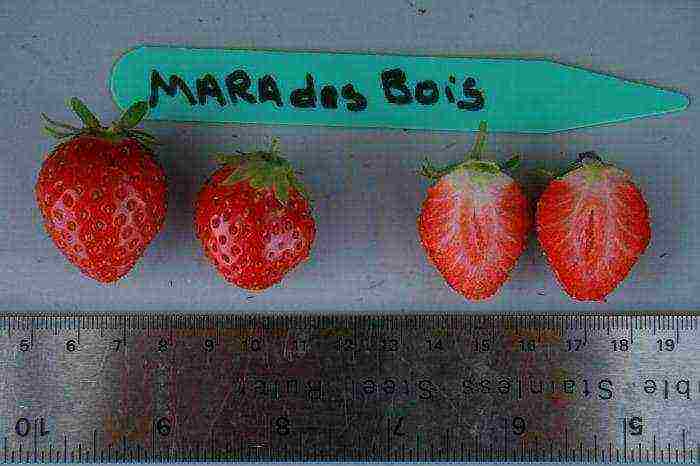
2.Queen Elizabeth
There are two types of plants. The first variant was bred by Dutch breeders. The second was obtained thanks to the work of domestic specialists. Description of the variety: large, beautiful fruits, reaching up to 100 g of mass, have a relatively dense pulp, delicate taste. Harvests begin in the first growing season. Photo:
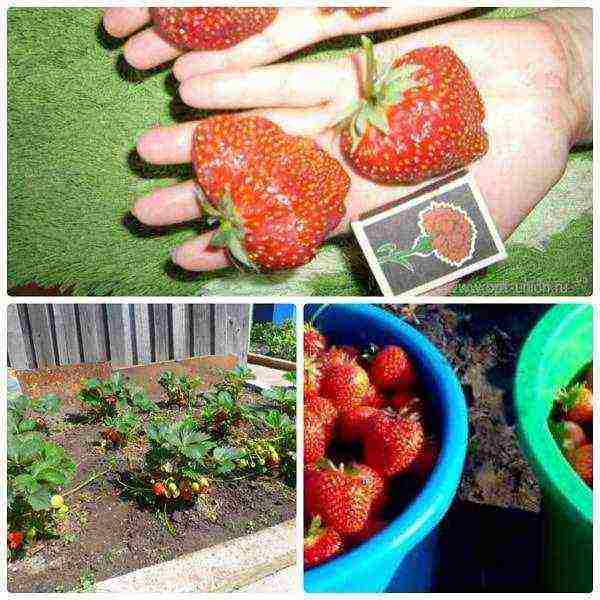
Strawberry variety Elizaveta is used in solving problems of original vertical gardening, on low beds with two row planting, alpine slides. To preserve large fruits, annual renewal is required. We wrote about it in detail in this article. Reviews about her:
3.Albion
Discovered by experts from California. The patent was registered in 2006. A high-yielding, drought-resistant, disease-resistant species. Fruiting with a real harvest occurs in the second year of growth. Low frost resistance is considered a negative quality. Photo:

Experts recommend growing the Albion strawberry variety indoors, in a warm climate. It has high peduncles, dark red, glossy berries of large size that do not touch the ground. With effective care, 2 kg of fruits are harvested from the bush. Reviews about her:
4 temptation
Juicy, strong pulp has an original nutmeg taste. The size of the fruits reaches 40 g. It stands out for the height of the flower stems, beautifully towering above the bush. There is a possibility of easy maintenance in case of application for solving problems of decorative gardening. Grows well in pots, hanging planters. An adult bush grows up to 20 strong peduncles. The first crop arrives 40 days after planting. It is quite advisable to grow strawberries on the balcony. The varieties of this species are unpretentious and quite resistant to minor temperature changes. Photo:
5 San Andreas
Frost-resistant, transportable, obtained by breeders in California. The Andreas strawberry variety has sweet, aromatic berries with an average size of about 30 g. Active fruiting lasts until October. Photo:
Large species
Dessert crops are of great interest. In the proposals of breeders from different countries, you can find a species that provides any requests for cultivation in different climatic regions of the country. At the same time, I would like to see large sweet berries on the table that correspond to the highest rates for a particular type of plant. You can try the best strawberry varieties on your site, taken from the following list:
1.Honey
Large-fruited American specimen. Became famous in 1979. It was obtained by the methods of crossing technology of the famous varieties Vibrant, Holiday. Frost resistant, low maintenance, widely used in industrial production. Photo:
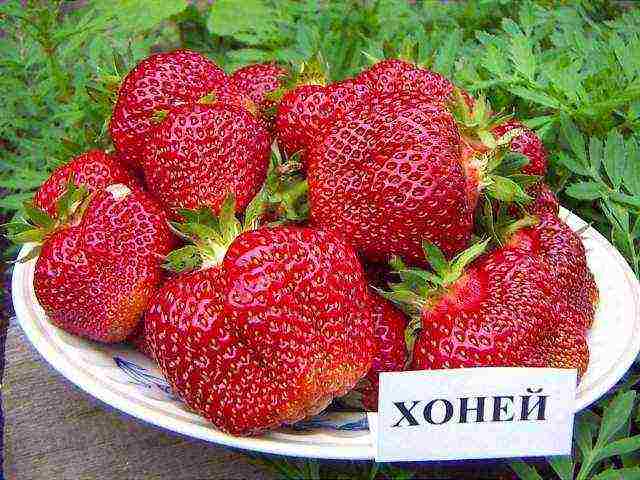
Variety description: medium-sized, high-yielding plant with erect peduncles. The wide conical shape of the berries is distinguished by an original sweet and sour taste. They have a dark, red tint. The fruits are transportable, well stored. The average value of the mass is 30 g. With the simultaneous ripening of berries, the yield from one bush reaches 500 g. From them, high quality jam is obtained. The popular strawberry variety Honey is the leading industrial berry in Europe. An increased susceptibility to verticillium disease caused by the fungus Verticillium is considered a disadvantage. What they say about growing:
2.Strawberry Lord
With timely, high-quality care, you can get an excellent harvest of large, sweet and sour berries, reaching a mass of 100 g without transplanting for ten years without transplantation. Description of the variety: powerful flower stalks are formed on tall bushes. Their number is increasing every year. The maximum yield is formed in the second, third year of growth. Up to 5 kg of berries are harvested from one bush. Photo:
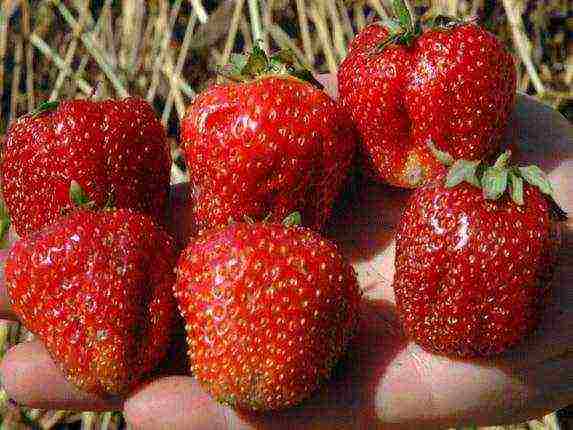
Stable resistance to adverse weather conditions makes it possible to successfully cultivate fruits even in the Urals. And these are the best strawberry varieties for the Moscow region, according to gardeners. Reviews about her:
3.Gigantella
A frost-resistant species obtained by selection of Dutch specialists. Description of the variety: a tall plant, decorated with spreading leaves, forms strong peduncles with bright, scarlet berries of large sizes. The mass of the bulk of the berries is 100 g. Photo:

The Gigantella strawberry variety is classified as a medium, late ripening type. Its advantage is considered to be increased resistance to damage by strawberry mites, the appearance of gray rot. The disadvantage is the rapid damage to early flowers by frost, the requirement of regular watering. What gardeners say:
4.Maxim
Dutch species, distinguished by the large size of the bush, corrugated leaves, stalks, bright red berries, root system. The harvest dates are late. The shape of the fruit is similar to that of a medium-sized tomato. The yield of a mature plant is 2 kg. This type of berry is said to be the best for frozen storage. The strawberry variety Maxim tolerates transportation, storage well. And here are the berries:
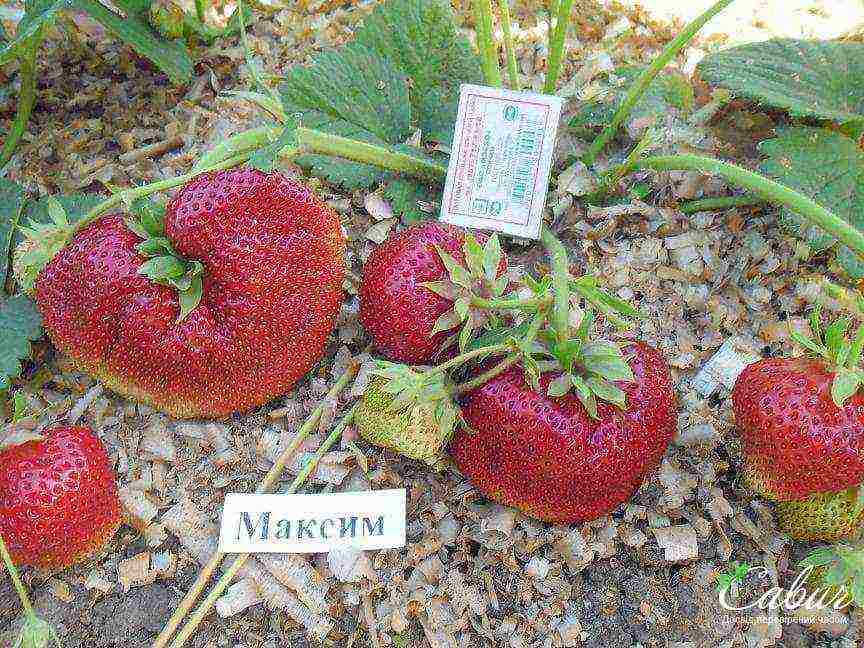
5 the divine
An extremely early species, obtained by domestic breeding in 1987 due to a combination of properties of such species as Festivalnaya, Holiday.A high-yielding bush with a pronounced central stem with numerous small leaves, strong, high peduncles, is known for frost resistance, high productivity of large, dry berries of an elongated beautiful shape. They are easily stored, transported without damage. Differs in the ability to form a set of whiskers, which is used for reproduction when renewing plantings. Photo:
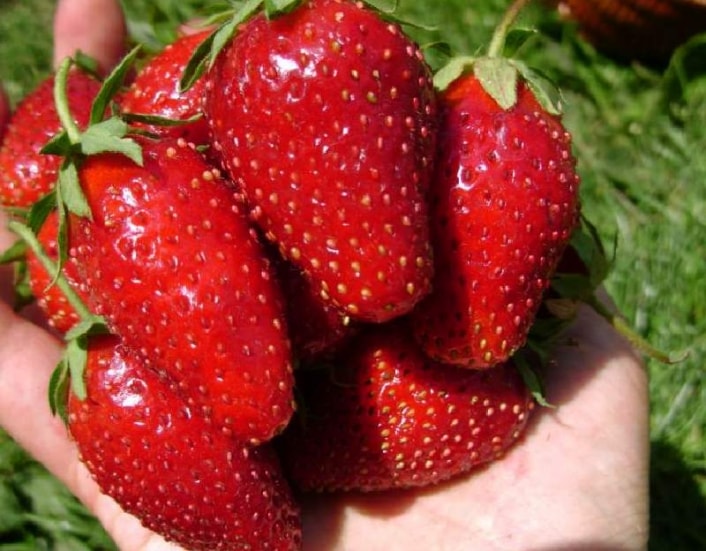
6 Darselect
A mid-season variety, discovered by breeders in France in 1998, the Elsanta variety was taken as the basis for the selection. This rather popular specimen has a large bush, strong erect peduncles, conical, large fruits of a bright, brick color with an orange tint, pink flesh. The sweet strawberry flavor of the unpretentious berry has made it a common commercial strawberry in France. The yield of one plant reaches 800 g. It is characterized by high winter hardiness, excellent transportability. In hot weather without constant watering, productivity is significantly reduced. Photo:
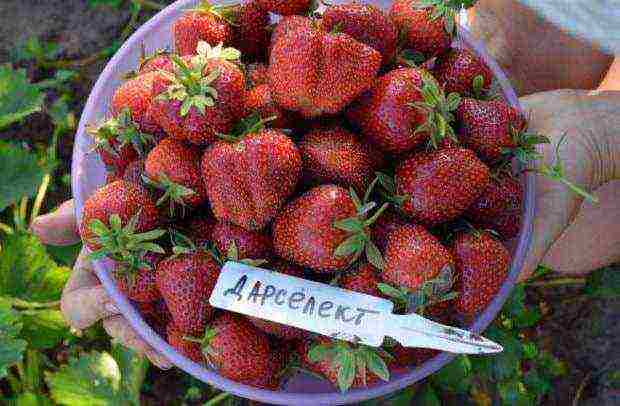
7.Festivalnaya
A universal type of plant, bred by Russian breeders in the city of Pavlovsk. The basis was the well-known species - Abundant, Premier. Refers to varieties with average harvest time, but may have a long ripening period depending on local climatic conditions. The overall yield is high. Fruits, of an original elongated shape, large, red, shiny. The juicy pulp has a bright pink color, a pleasant sweet and sour taste. The drought-resistant, winter-hardy species has long become a favorite among many gardeners and farmers. Photos:
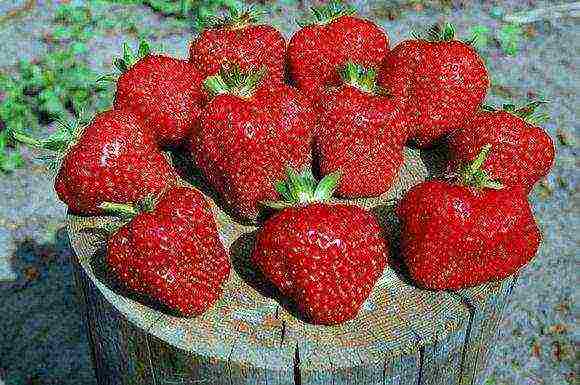
Now there is a modern strawberry cultivar Festivalnaya Florida. High-yielding, characterized by large fruits similar to those of the Festivalnaya species, obtained at the University of Florida. At the famous Strawberry Festival, he took first place after comparing all indicators. Reviews:
8 Chamora Turusi
The Japanese variety of Chamoru strawberries is very late in the formation of the crop. It has large, sweet, dark colored berries. Their weight is 100 g. The shape of the berries resembles a cone with powerful folds. The core is light in color, with an air cavity. The weight of giants - scallops, collected from one bush, reaches 3 kg. Fruiting is formed in the first growing season of the plant, reaching maximum values in the third year of development. In the first season, one strong peduncle is formed, on which berries weighing up to 150 g grow. The bushes are powerful, spreading, and are distinguished by rapid growth. Photo:
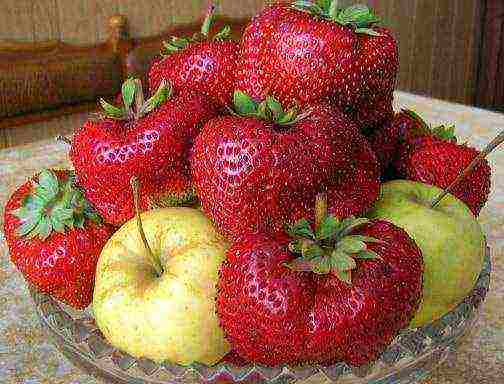
The advantage of Chamor is long-term, high yield, transportable qualities of very large berries, resistance to many diseases and pests. What strawberry growers say:
9. Zenga Zengana
It is considered one of the most common species among gardeners in Russia, obtained by German breeders. The climate of central Russia makes it possible to grow early varieties of Zenga strawberries. An important advantage is its resistance to various diseases and pests. Known to many, sweet, large cone-shaped fruits are remembered for their bright red pulp, thick peel, which allows them to keep their shape when freezing, cooking compotes. Photo:

10 marshal
An ancient species known as the 1890 development by US breeder Marshall F. Ewell. A universal type of berry with an average ripening period and is now popular among gardeners in many countries. It is distinguished by large red scallop-shaped fruits, juicy bright pulp of the original sweet taste with a slight sourness. Bushes of winter-hardy strawberries are tall, powerful, with erect peduncles. Triple strong leaves are located above the berries. It is resistant to drought, many diseases and pests. Forms many strong mustaches.
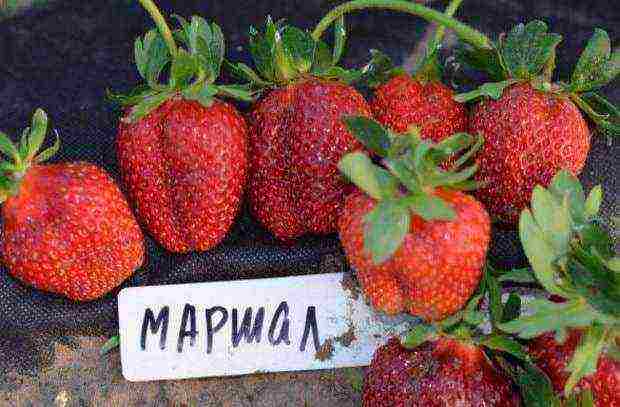
11 Victoria
An old, well-known species brought from America hundreds of years ago. Dessert berry memorable for its appearance, taste, aroma.Together with the Gigantella variety, it is in demand among summer residents. On a powerful bush, several tall, strong peduncles are formed with very large orange berries, an unusual aroma. Berries adhere tightly to the stalk. While eating, they must be bitten off like a large fruit. Photo:
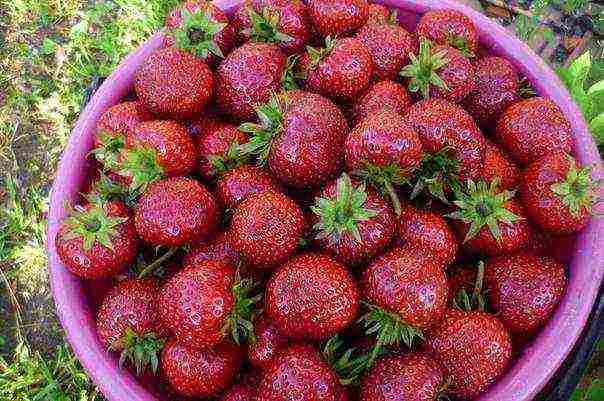
12.Mashenka
Sometimes called "Moscow Jubilee". Received by domestic breeders 50 years ago. Differs in large berries, aroma, high taste. A scallop-like shape, berries often form due to the joint growth of closely spaced flowers. This explains the emergence of very large berries on a medium spreading bush of compact size. The high density of the pulp allows you to transport, store the berry without loss. The disadvantage is sensitivity to frost during flowering, exposure to the hot sun with the formation of harmful burns.
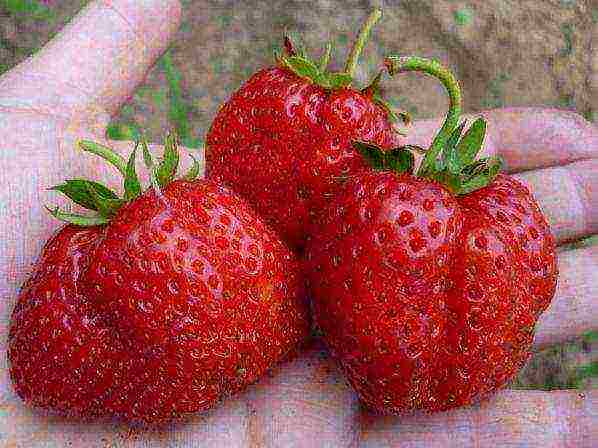
13 Malvina
Modern type of late fruiting with large tasty berries. It was created by German breeders in 2010. The flowers are self-pollinating, hidden under rich green leaves. The yield is average. Strawberry variety Malvina is resistant to rainy weather, which is important for the late ripening of berries. Most of all it is affected by thrips, weevil. The berries are characterized by a sweet dessert flavor. Photo:
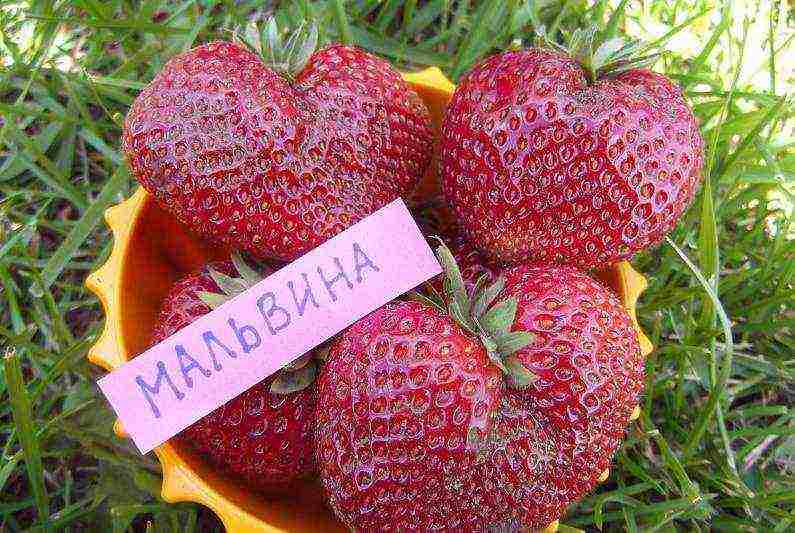
14.Kamarosa
Created in California, has proven itself very well when grown indoors. The plant has very large fruits that retain this size throughout the total fruiting period. The fruit tastes great. It is profitable to sell them. The demand for them is always great.
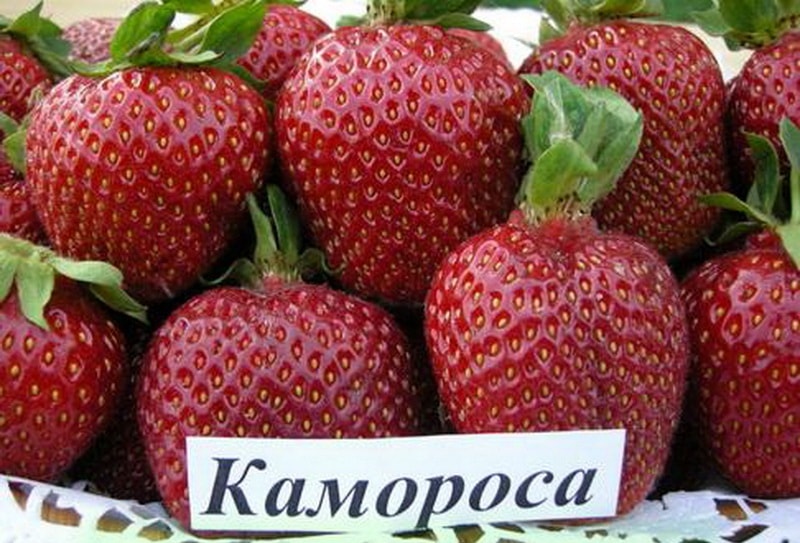
15.Marmolada
Winter-hardy Italian species with large fruits. They are characterized by a conical shape ending in an original sharp end. The average value of the mass is 70 g. The pulp is red, dense, ensuring long-term storage of high-quality transportation. The plant is strong, tall, winter-hardy. The yield is high. It is used for making jam, compotes, freezing, as a favorite fresh delicacy. Sweet taste, wonderful appearance attracts attention. Any quantity of Marmolada berries offered on the market is quickly sold out.
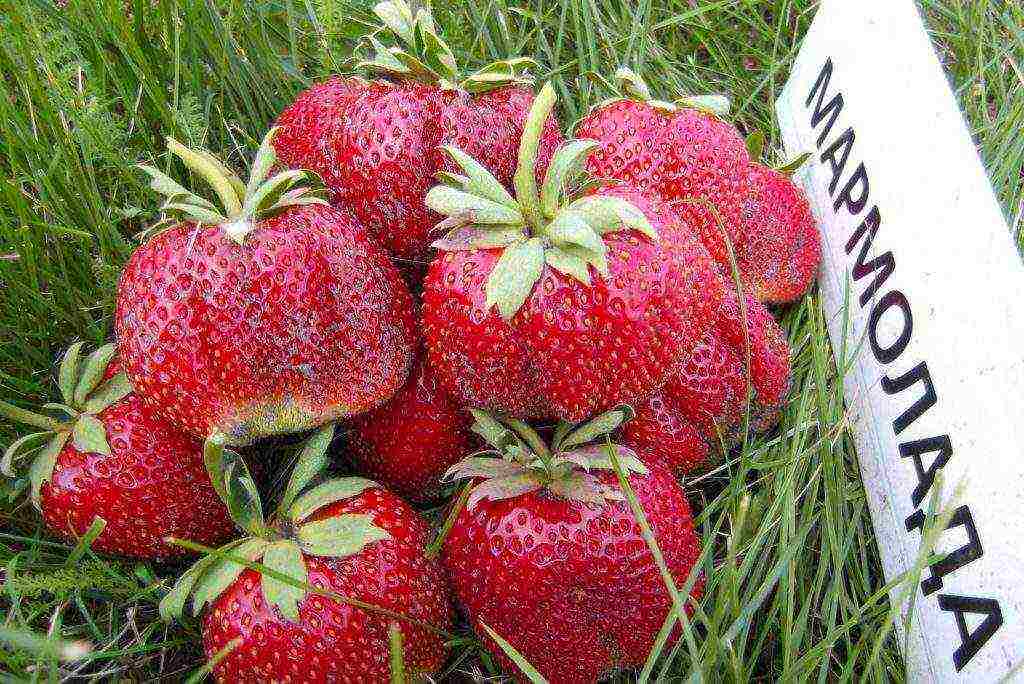
16. Galya Chiv (civ)
Developed in Italy. The bush is large, powerful. Peduncles grow above the level of large leaves. The average weight of conical orange berries is about 70 g. The pulp is pink, aromatic. The stalk is easily removed without damaging the berry. Photo:
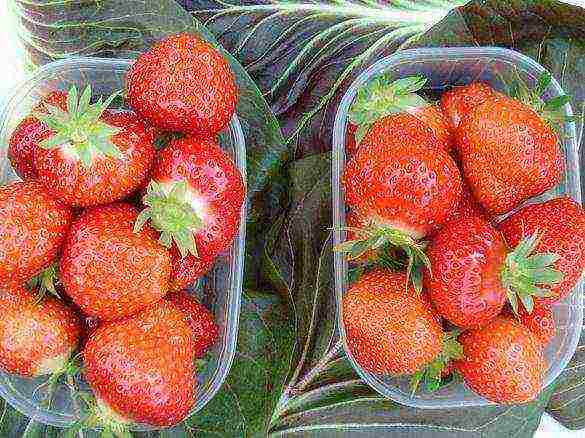
Dessert type of medium ripening period without loss transfers transportation. Even over long distances. Together with the berries Sonata, Darselect, Marmolada is one of the four popular industrial varieties. What gardeners tell (reviews):
17 sonata
One of the most common picky types of Dutch strawberry selection in 1990. Compact bushes of the plant are grown using any technology of open ground, film greenhouses. Shirokokonicheskie bright fruits of red color, which do not darken during storage, have a pleasant dessert taste, delicate aroma. Fruits are large in size, reaching 70 g, dry, well withstand transportation. The bush forms a small number of whiskers. What gardeners say:
Early varieties
Along with the onset of spring, the first rays of the sun, I really want to look at the strawberry garden, put it in order, expect the most delicious first berries. We suggest considering the following varieties of strawberries (with photos and descriptions):
1.Elsanta
The Dutch mid-season species, obtained by crossing Gorella Holiday varieties, grows in a small bush, forming few new whiskers and rosettes. The shape of sweet and sour, red berries is broadly conical, with an average weight of 15 g. It can withstand transportation over long distances. For commercial use, it is grown on plantations in many European countries.Requires minimal care costs, delighting with a rich harvest of fragrant berries. Varietal characteristics without special agronomic techniques persist for several years. It is cultivated with equal success in open, closed ground.
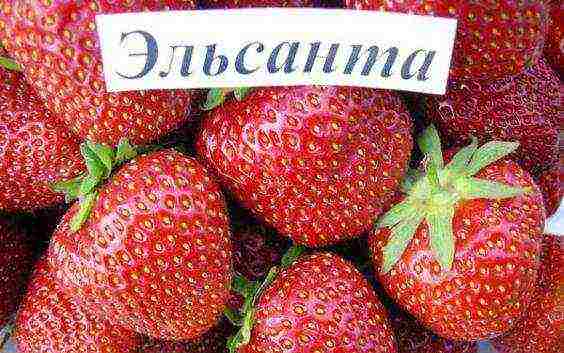
2.Asia
The strawberry variety Asia obtained by breeders in Italy is successfully used in farms with industrial plantations in Russia and Ukraine. It is classified as a type of medium early maturation. Description of the variety: large bushes with wide leaves, powerful peduncles. The average weight of berries reaches 40 g. They have an elongated conical shape, sweet with the aroma of wild strawberries. Due to their good appearance, the berries are especially popular and in demand in the markets. Photo:

The fruits are stored for a long time, they tolerate transportation well. The species is resistant to anthracosis and powdery mildew. Reviews about the berry:
3.Alba
The high-quality industrial strawberry Alba, which comes from breeders in Italy, has many advantages. Among them, the yield, reaching 1.3 kg per plant, the possibility of long-term storage, excellent transportable qualities, increased resistance to bacterial burns and other diseases.
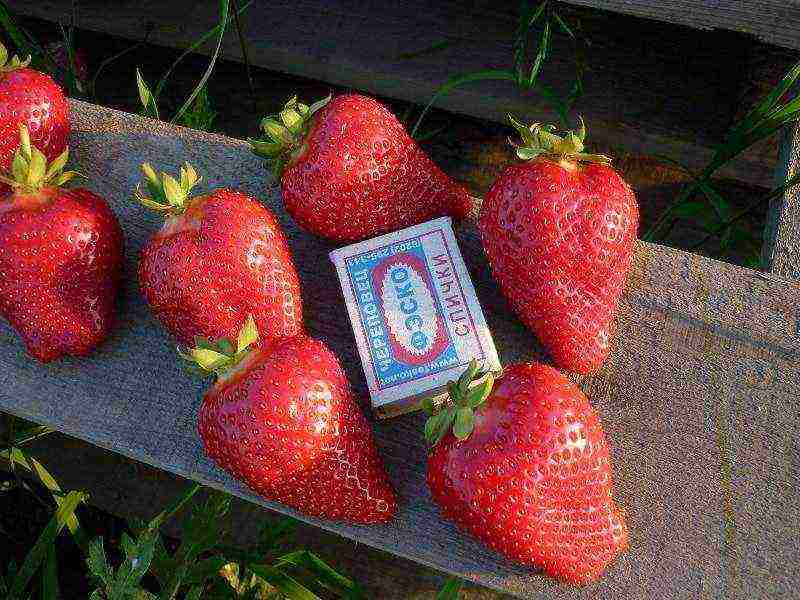
Using shelters, they get large, tasty berries in early spring, which is important for profitable sales. Bushes are powerful, tall, frost-resistant. Berries of an elongated shape with a brilliant red hue retain an average weight of 30 g during the general fruiting season. The ripening period of berries on plants is long and uniform. What gardeners say:
4.Clery
It appeared thanks to the results of the selection of Italian specialists. Its distinctive quality is considered to be absolute immunity to common diseases of this berry. The mighty plant with large leaves is adorned with shiny, succulent, conical, scarlet berries, the same on all peduncles. The average weight reaches 30 g. Berries have a sweet taste. Photo:
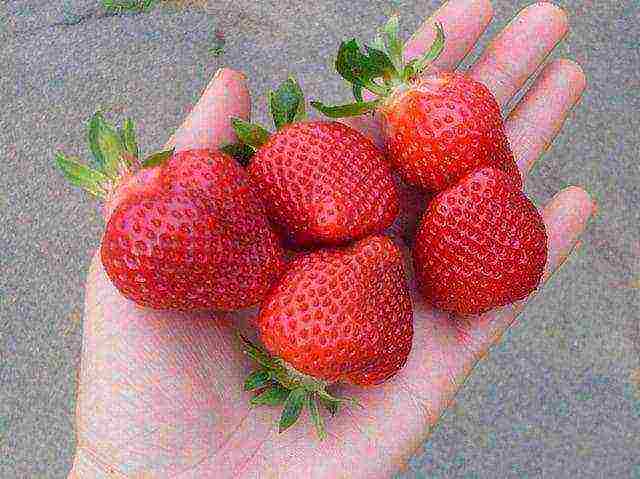
High-yielding. It is considered a good specimen for continental climate conditions. Withstands frost well. In conditions of a decrease in temperature, a weakening of illumination, the berries ripen, retain their taste. The Clery strawberry variety is capable of producing a large number of new outlets every year. Reviews:
5 marshmallow
Strawberry marshmallow sourced in Denmark. It has tall bushes with tall, thick peduncles covered with a large number of flower buds. In winter, bushes require special cover with a snow cap, for example. They can withstand severe frosts under the snow. Snowless winters, thaws can completely destroy plantations. Dark, red berries have the shape of a large scallop, weighing up to 35 g. A distinctive quality is the simultaneous ripening of the crop. And here are the berries themselves:
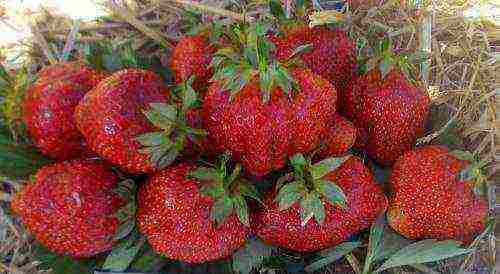
6 kimberly
A well-known species from Holland, distinguished by a pleasant sweet-sour taste of delicate caramel. The berries are bright red in the shape of a regular cone. The average value of the mass is about 50 g. High transportable qualities, early periods of obtaining a rich harvest make it possible to use the Kimberley strawberry variety for profitable sale. The Harvest Receipt period lasts about three weeks. Disadvantages are considered to be an increased likelihood of leaf spot. Photo:
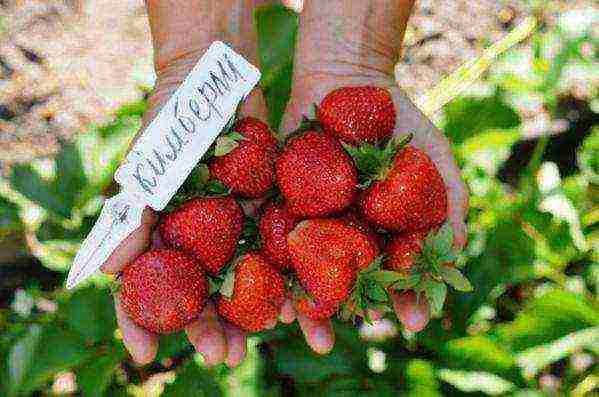
Before choosing, you need to objectively assess the capabilities of your own care technology, the climatic conditions of the region, the geographical position of your own site. Good luck, success in achieving an excellent harvest of delicious berries, from spring to late autumn, will accompany this exciting business. Reviews:
Other varieties of berries
1 the merchant's wife
By the middle of the season, the strawberry variety Kupchikha ripens. Description: berries, with an elongated fruit shape, have a bright red color of a dark shade, weight about 25 g. Average yield is low, about 300 g, when harvested from a bush. Appreciated for high stability during transportation.Berries, dryish on the outside, juicy inside, soft, with an extraordinary aroma of strawberries. The beginning of berry picking coincides with the end of June.
The local name of the variety is Zemklunika. It is a hybrid obtained by Russian breeders by combining the properties of strawberries with ordinary European strawberries. The appearance of berry leaves resembles strawberry leaves. They have a trifoliate shape and are bright green in color. The number of peduncles covered with large snow-white flowers reaches 15 per bush. The beauty of the bushes allows you to use the variety for decorative purposes, growing along the edges of flower beds. Leaving is considered uncomplicated. He has excellent winter hardiness, resistance to powdery mildew, gray mold. An adult bush forms many whiskers with rosettes suitable for breeding. It develops well in fertilized, sunny places, loves watering, feeding. Withstands partial shade, forming large berries that ripen a little later. Quite often it is practiced for growing on industrial plantations the strawberry variety Kupchikha. Photo:
2.Vima
There is a series of varieties (Rina, Tarda, Ksima, Zanta) with such a common name. They are not considered relatives, but are obtained by the selection of the Vissers company from Holland:
- Rome. The variety is considered the best remontant variety of the Dutch strawberries due to the high taste characteristics of the berries. Even the last harvest, taken before the frost, does not lose its taste. The first fruits ripen in early summer. The second stage of the main harvest is observed in August. The variety begins to bear fruit in the first growing season. The bush grows sprawling, powerful ribbed leaves, painted in a light green color. He has high peduncles, a small number of mustaches. Cone-shaped berries of bright, red color, firm with a juicy core. Their average weight is 40 g. They tolerate transportation well. The species is resistant to diseases inherent in strawberries, winter cold conditions of a temperate climate.
- Zanta. The mid-early strawberry is obtained from combining the properties of the Elsant and Korona varieties. Large aromatic, red (no gloss), sweet berries with a weak sour taste reach a mass of 50 g. Up to 2 kg of berries can be harvested from one adult bush. They come off easily and are suitable for long-term transport. The variety is not susceptible to diseases (powdery mildew, verticillosis), and is characterized by high winter hardiness. Does not need frequent watering, does not require special soil fertility. A good harvest gives in a dedicated place no more than three years. The berries ripen in mid-June.
- Xima. Large-fruited late variety. Bushes are powerful, tall stalks, comb berries, reaching 120 g, juicy, fleshy, sweet and sour. They are located above the leaves. The average yield of one plant reaches 1 kg. The drought-resistant variety gives birth to few mustache for reproduction, it is susceptible to gray rot disease in case of excess moisture.
Tarde. The latest, high-yielding type of the Wima series. The variety was obtained by combining Vikoda varieties with Vima Zanta. The maximum intake of berries is in July. The average weight of cone-shaped berries is 50 g. The berries are dark red with a yellow tip, glossy surface. They are often used to decorate various baked goods. The variety can withstand frosts when covered with snow, spruce legs. Not susceptible to many diseases.
3 sensation
A successful novelty for Dutch breeders in recent years. They managed to create a medium-ripening variety with particularly strong roots that provide high plant characteristics. They acquire resistance to numerous diseases, tolerate drought and frost well. Sweet, fragrant berries of large sizes also become insensitive to summer heat and rot. The average mass of fruits, characterized by a regular conical shape, with an orange-red tint, is about 25 g.The fast-growing shrub is distinguished by a compact shape, easy to care for, long peduncles above the surface of the leaves, flowers with a large number of pollen, which ensures effective pollination of the plantation. The degree of use of the variety will be determined after several seasons.
4.Ample strawberry
An amazing plant, decorated with many flowers, and then fragrant berries, it has become popular with connoisseurs of strawberries. Various technologies have been mastered for creating beautiful, tasty thickets based on effective varieties of the type:
- Alyuba. The plant was obtained by combining the varieties Fristar, Rapella. A distinctive feature is the presence of long peduncles with oblong fruits weighing up to 40 g. They have a sweet taste, dense flesh. When placed on a trellis, it is not affected by gray rot:
- Novel. The hybrid blooms continuously with beautiful pink flowers. Their formation does not depend on the length of daylight hours. The berries resemble a large drop. On decorative, compact bushes, a lot of whiskers and inflorescences are formed, providing high yields.
- Elan. The variety is endowed with reliable resistance to the action of any negative factors. Bushes thrive even in low light conditions. The mass of berries reaches 35 g.
- Tarpan. Large berries (40 g) have a strong strawberry smell. Ripen during the summer season.
- Pineapple, Laurent, Temation, and other varieties of ampelous strawberries are actively introduced in home gardening.
5 Sans Andreas
A repaired American species with up to four stages of fruiting. The average weight of fruits is 35 g. Often giants the size of a hen's egg are found. The sweet berries are firm, shiny with a bright red hue. The seeds are planted deep in the pulp. It is orange in color with light streaks. The shape of the berries is conical with a smoothed tip. They hold tightly to the stem. The strawberry type was obtained by crossing Albion, Cal 97.86-1 in 2001. The variety is considered a neutral light-time plant. This means that the reduction in the light part of the day does not affect the formation of berries. Their first arrival occurs in May and lasts until late autumn. The yield of an adult bush is about 1000 g. The bushes are overgrown with an average number of mustaches, are resistant to many diseases, unfavorable weather.
6.Shelf
An unpretentious, time-tested variety grown in the middle lane. The popularity of the variety is due to the period of maximum yield in the summer. Strawberry flowering takes place after the threat of spring frosts. The flowers are not damaged, a large number of bright red fruits are set, covered with a beautiful glossy shine. The pulp is dense, with a caramel aroma, light pink in color. The bushes are strong, overgrown with a large mass of foliage. The average weight of the berries is 20 g. The area is 1 sq. M. provides a strawberry harvest of 2 kg. The variety is not grown anywhere for more than three years due to a decrease in yield. The disadvantage of the variety is the relative vulnerability of the roots, susceptibility to diseases inherent in the plant. For planting, regular watering, feeding, loosening the soil, and treatment with appropriate chemicals are required. The average value of resistance to winter cold, requires a mandatory shelter.
7 Elsanta
The plant species obtained from the maternal types of strawberries Gorella and Holiday was included in the list of varieties in Russia in 1975. He deservedly became one of the main industrial varieties in Europe, took a reliable place in personal plots. This is an unpretentious variety of medium fruiting times, used for growing by various technological options. Elsanta bushes are tall, with a large number of leaves, peduncles, strong whiskers. The berries are small (about 15 g), but there are many of them. One plant produces 1.5 kg of strawberries. The berries are easily detached from the stalk. You can distinguish fruits from other types of strawberries by the rim around the neck of the berry.The plant is resistant to many diseases. It does not require numerous fertilizing, it likes frequent watering. Summer heat is difficult.
8 marmalade
It is an Italian variety of medium time of arrival with a high yield of tasty, aromatic berries. The variety that yields large, beautiful fruits is not remontant. No crop arrives in the initial growing season. Gardeners have been successfully growing the variety since the beginning of 1989, admiring its unpretentiousness, extraordinary strawberry aroma, well-stored berries. 1 kg of strawberries are removed from one full-fledged plant. The bushes have high peduncles, white, large flowers, tolerate temperature changes well, irregular watering. The stability of the appearance of diseases in Marmalade is not very high. Chemical treatment required. The variety is grown as an industrial crop.
9 the queen
The Russian type of strawberry, obtained by selection from the varieties Venta, Red Gontlet, is distinguished by an increase in resistance to cold climatic conditions. It was created specifically for planting in colder climates. There are very few varieties with such capabilities. One-time fruiting of the short light-time variety occurs in June. The bushes are compact, with an average number of leaves, reddish whiskers, covered with hairs. Flowers are white, cone-shaped berries of deep red color, weighing up to 45 g. The pulp is juicy, dense, slightly sour with a weak aroma. The yield from 1 square meter reaches 1 kg of strawberries. The variety perfectly tolerates frosts up to 22 ° in the absence of snow and up to 40 ° with a shelter with spruce legs. Summer heat and high temperatures are easily tolerated by the Queen.
10 Geneva
The best of the remontant varieties of American selection. It appeared in the 80s of the last century. Its main advantage is considered to be abundant fruiting, which lasts for several years of cultivation. Medium, wide bushes with peduncles that do not rise above it, but hold the berries in an almost horizontal direction. The first harvest, ripening in June, has a mass of about 50 g of dark red, almost cherry berries. The dormant period for the variety lasts up to three weeks. Further, a new flowering begins, the formation of ovaries even on young rosettes with seven leaves. Productivity in rainy summer weather does not drop. Strawberry plants grow rapidly. Therefore, they are placed at such a distance that there is no touch of the bushes. Otherwise, gray rot appears. The variety has reliable resistance against other diseases. The number of whiskers is not large. They try to spread them evenly on the surface of the garden until it is completely filled.
What are the best varieties to use for seedlings?
The optimal age of seedlings intended for planting is considered to be a year. No damage, strong root system should be on bushes of any kind. For example, the following views are welcome:
- Zenga-Zengana. A variety of German selection obtained in the post-war years on the basis of strawberries Marne, Sieger. Large, tasty, angular, conical, carmine-red berries with sunken seeds into the fragrant red pulp. Ripening occurs in the late period. The ability to independently recover from damage by unfavorable climatic conditions has made the variety widespread and loved in Europe, Russia and now. It is considered resistant to many strawberry diseases. Bushes grow powerful large. Requires planting at large distances between plants. For planting, it is not recommended to make high beds. This helps the plants maintain their resilience during the summer drought.
- An excellent pupil. The variety has beautiful, tasty berries with a special sugar and ascorbic acid content. They are recommended to be used for fresh food. The mass of berries is 15 g. The yield reaches record values of 5 kg per 1 sq. M. m. The species is immune to disease. It was obtained on the basis of crossing the properties of the varieties Junia Smides and Krasavitsa.Strawberry bushes are tall, compact, easy to care for. The leaves do not form a shadow on the berries, creating conditions for their amicable ripening.
- Pendant. Winter-hardy, high-yield variety that can withstand frost, is not susceptible to diseases. The bright, red berries do not deteriorate even when stored indoors for three days. The pulp is dense, fragrant, ensuring the preservation of excellent qualities during transportation. A medium-fruiting plant species obtained by crossing Redcoat varieties with Purpurova strawberries. In the second season after planting, the yield reaches 20 kg per sq. M.
- Found Good. An early variety of early-growing berries, obtained by breeding the common types of Festivalnaya and Purpurovaya strawberries. Disease-resistant bushes, differ in the appearance of leaves with blunt, large teeth, horizontal position, shaggy petiole, curved top. The berries are orange in color, with an average weight of 20 g. The pulp is light, sweet, with high dessert qualities.
How to properly care for seedlings?
A technology for preparing strawberry seedlings called Frigo is now used. Its main point is the creation of dormant conditions for seedlings of any kind. The technology is used for reproduction, preservation of seedlings, ready for transplanting when growing plants all year round. The main stages of seedling care:
- On ordinary beds, in greenhouses, in tunnel shelters, mother bushes of plants are planted. Peduncles on them are regularly removed so that the plant uses the strength to give birth to new rosettes.
- Young bushes are intensively watered and fertilized.
- The readiness of seedlings is determined by the type of roots. They should turn brown with light tips. The leaves turn brown, which confirms the state of hibernation of young bushes. Most often this occurs at the end of October, November.
- The dug out plants are brought into a cool room with a temperature of about 12 °.
- The roots are shaken off. Washing, cutting them is prohibited. Large dry leaves are removed. The leaves next to the growth point should be preserved. The seedlings are sprayed with a fungicide, loaded into small-volume film bags with a film thickness not exceeding 0.5 mm.
- Sacks with seedlings are placed in cold places with a humidity of 90% and T from 0 to 2 ° C. These parameters must be strictly observed so that the seedlings do not die. The shelf life of seedlings varies from several weeks to a year.
- Seedling awakening. Seedlings in the package are kept for 24 hours at room temperature. Then the roots of the seedlings are immersed in water containing a biostimulant solution for three hours. At the same time, lost moisture is restored, vitality is activated. The solution should not come into contact with the seedlings' core.
Planting in the ground, top dressing, watering should be carried out according to standard technology.
Which varieties are suitable for growing in a greenhouse?
The following take root well:
- Darselect. It is a medium-ripening French variety with strong roots, large berries with a strong strawberry aroma.
- Queen Elizabeth. It is considered the best variety, resistant to diseases, with a high yield of tasty, juicy berries. Differs in increased frost resistance, unpretentious requirements for the composition of the soil. It has two peaks of berry ripening.
- Honey. An early amicable ripening variety of American selection. Refers to the list of the most transportable types. Frost-hardy species with dark red berries with a sour taste.
- Mount Everest. The variety of French breeders is distinguished by the absence of small fruits. The average mass of cone-shaped berries is 40 g. Fruit pulp has a special content of juice and sugar. Strawberry bushes are spreading, low in height with a small number of whiskers.
- Professional. A late-ripening variety presented by breeders in France. The appearance of large, bright red, with pink pulp, elongated berries, makes you want to have a variety in the garden. The crop tolerates transportation well.
- Crimean remontant.A fertile variety of dense, dark red berries with a special aroma. You can enjoy it until autumn. Strawberry bushes are resistant to cold snaps and diseases. During transportation, care and attention is required.
- Carnival. Fruits are formed on the bushes until late autumn. The strawberry species does not have increased care requirements. Fruits of medium weight, sweet.
- Clery. One of the very early, high yielding, transportable varieties introduced by Italy. The maximum yield of brilliant, juicy red berries is formed in the second season.
It is quite difficult to answer the question of which variety of garden strawberries is the largest. This is due to the fact that each climate zone has its own "gladiators".
The largest varieties of strawberries
According to most experts, the largest strawberry varieties include:
- Comrade Winner.
- Gigantella-Maxim.
- Shelf.
- Kiss-Nellis.
- Primella.
- Great Britain.
- Marshal.
Each of these varieties has advantages and disadvantages.
Features of the variety "Kamrad-Winner"
This is a German variety of garden strawberries. A detailed description of this variety is given in the plate.
| Bush | The height is 40 centimeters. |
| Leaves | Wide, their color is dark green. |
| Flowers | White. |
| Peduncle | 2 within 12 months. At the same time, up to 10 fruits ripen. For the second 12 months - up to 6 peduncles. |
| Berry weight | 40-100 grams |
| Berry flavor | Sweet, delicate. |
| Berry color | Dark red, glossy present. The pulp sparkles. |
| Drought tolerance | High. |
| Frost resistance | Good. |
| Diseases | Resistance to the main pathologies of garden strawberries. |
| Life span | 5-7 years in one place. |
This is a rather rare variety that has not yet received due popularity in the territory of the CIS countries.
How to plant correctly
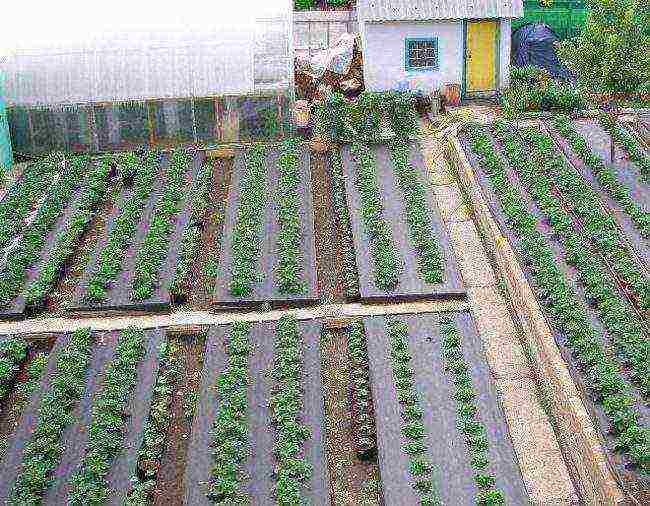
To prevent heavy berries from lying on the ground, you need to use mulch or black material.
The quality of the harvest directly depends on the planting of strawberries. Therefore, it is very important to adhere to the following recommendations:
- if the soil is too acidic, it must be fertilized with lime at the rate of 1 cup / 1 square meter;
- recommended landing pattern - 55 centimeters of distance between bushes, location of ridges - from east to west, distance between rows - 70 centimeters;
- if the soil is not fertile enough, it is allowed to add a little humus before planting;
- when planting strawberries, you need to carefully monitor the deepening of the culture.
How to properly care
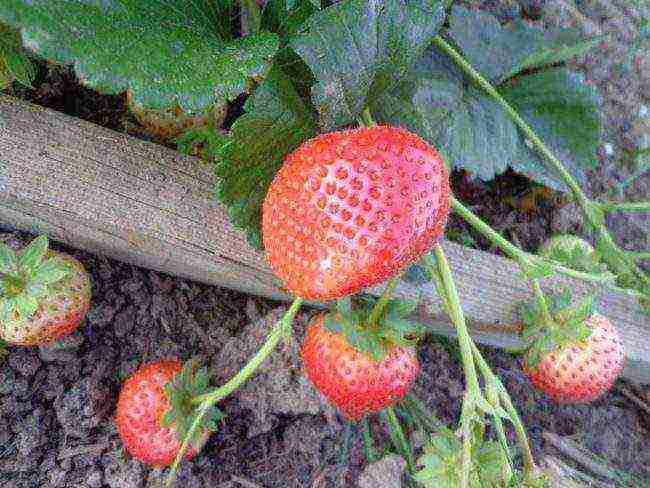
For a good harvest, you need to feed the strawberries at least twice a season.
The survival rate of the crop and the yield indicators directly depend on proper care.
Comrad-Winner is a large-fruited crop, the content of which is subject to increased requirements.
The features of proper care are presented in the plate.
| Stage | Description |
| Watering | Water should not expose the roots of the culture. But you should also make sure that it does not flood the heart and center of the strawberry. |
| Top dressing | In March - April, you need to introduce ammonium nitrate. Volumes - 10 grams / 1 square meter. |
| Flowering phase | Treatment with the stimulant of fruit formation "Ovyaz". |
| Pest control | Treatment with Colloidal Sulfur and Fitosporin is recommended. |
It is recommended to regularly weed the beds, loosen the soil, trim the antennae and remove old foliage. It is important to prevent the development of diseases in a timely manner.
Features of the Gigantella-Maxima variety
Berry yield - up to 1 kg per bush.
Large-fruited variety, very popular among gardeners, "born" in Holland.
| Term | Medium late. |
| Bush | Powerful, tall. |
| Peduncle | Large. |
| Mustache | Thick. |
| Plant diameter | 60 centimeters. |
| Plant height | 50 centimeters. |
| Berry weight | 60 to 125 grams. |
| Taste | Sweet, juicy, with subtle strawberry notes. |
| Pulp color | Bright red. |
| Productivity from 1 bush | Up to 1000 grams. |
| Cycle of life | Up to 4 years in one place. |
| Frost resistance | Up to -16 degrees. |
| Drought tolerance | High. |
Planting features
This variety of garden strawberries loves space. No more than 4 bushes should be planted per 1 square meter. You need to plant a crop in a well-lit area.
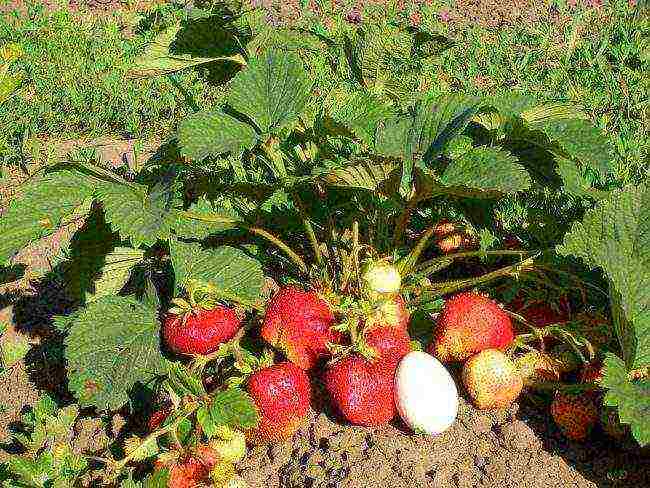
The variety has a powerful, sprawling bush, so strawberries are not planted close to.
The berry is propagated by seedlings. For this you need:
- Dig up the seedlings.
- Cut off from the main plant.
- Remove the mustache.
- Remove excess foliage.
- Shorten the roots, leaving only 6-7 centimeters.
You can plant such strawberries throughout the season.... You can start at the end of March, finish - 14 days before the first frost.
Care features
This variety is prone to some diseases typical of strawberries. Therefore, you need to feed the plant and process it from fungi 1-4 times in 12 months.
In spring, plantings are treated with Fitosporin solution to prevent gray rot.
- Transplant Maxim can be done once every 8 years.
- With the arrival of spring, it is recommended to treat the site with Fitosporin and Gumi... You need to dilute the funds as indicated in the instructions.
- When the first flowers appear, no more than 5 drops of Fitoverm should be added to the solution. By mid-July - in September, you need to thoroughly process the soil, introduce disinfectants.
- But you should also create a good agricultural background. To do this, it is necessary to add rotted compost to the soil annually. The optimal dosage is one bucket of compost per 1 square meter.
Shelf grade
Dense flesh without voids.
Sweet caramel flavor.
This variety was developed in Holland over 40 years ago. Since then, garden strawberries have gained wide popularity in the CIS countries. Polka's yield is quite average. But they love it for something else - the berries have an unusual caramel taste.
| Bush | Low, but thick enough, powerful. Its height is 12 centimeters. |
| Foliage | Bright, have a rich green tint. |
| Rugosity | Average. |
| Peduncles | They grow on a par with foliage, when fruits ripen, they tend to the ground. |
| Mustache quantity | Small. |
| Berry shape | Conical, blunt end. |
| Berry color | Dark red, glossy present. |
| Pulp | Light, cavities and voids are not available. |
| Taste | Juicy, sweet, there are unobtrusive caramel notes. |
| Berry weight | 30-60 grams. |
| Maturation | The beginning is from the sepal. |
The main advantages of the variety
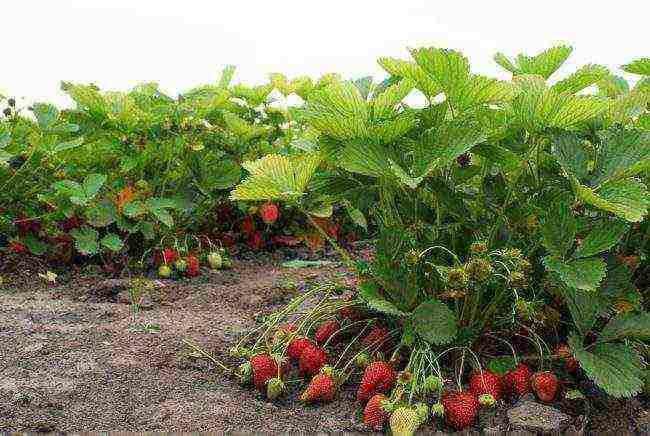
A fairly powerful bush that is resistant to fungal diseases.
The main advantages of the Shelf include:
- long-term;
- good safety during transportation;
- unusual, memorable taste;
- simultaneous ripening of fruits;
- resistance to fungal and other pathologies;
- high productivity.
The main disadvantages of the variety
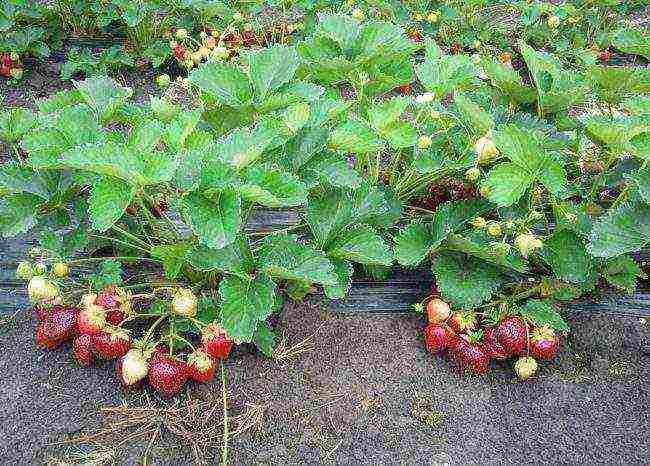
The variety requires planting renewal every two years.
The shelf is pretty moody. Its main disadvantages include:
- exactingness to watering;
- regularity of updates - after 24 months;
- intolerance to thickening.
Strawberries of this variety do not tolerate heat very well.... If not watered regularly, the fruit will lose its amazing caramel flavor.
The variety is hypersensitive to temperatures below -15 degrees. The beds should be covered with agrofibre.
Features of planting and care
It is recommended to plant the Shelf in the first half of August. If this is not possible, the main thing is to be in time before the onset of autumn. The distance between the shoots is 35 centimeters.

The last weeks of summer are the optimal time for planting Polka strawberries.
| Watering | Drip irrigation is recommended. If this is not the case, then you need to start watering the strawberries in mid-April. Irrigation is carried out every week until early August. By the 20th of August, you need to cut watering in half. It is recommended to water the crop in the evening. It is advisable to wait until sunset. The water should be warm. |
| Top dressing | The first feeding should be in the spring. you need to use mineral fertilizers.The best solution for this period is mullein infusion. After the buds appear, you must use potassium nitrate. It can be combined with chicken dung or ash. |
Kiss Nellis
High transportability of berries.
This is one of the largest-fruited varieties. The berries can weigh up to 100 grams. Average weight ranges from 50 to 60 grams.
| Berry shape | Truncated-conical |
| Fruit color | Dark cherry. |
| Bushes | Powerful, dense, very spreading. The diameter in the second year reaches 50 centimeters. |
| Leaves | Sometimes they have stipules, the shade of the foliage is light green, there is a dullness, the surface is corrugated. |
| Peduncles | Very durable, up to 1 centimeter in diameter. |
| Fruit location | Below the foliage. |
| Transportability | High. |
| Frost resistance | Up to -15 degrees. |
| Productivity from 1 bush | 1.5 kilograms. |
Primella
Sweet, slightly pineapple flavor.
This is a Dutch variety that has become widespread in the CIS countries. See the plate for up-to-date information.
| Term | Medium ripening. |
| Berry weight | 70 grams. |
| Fruit taste | Sweet, aromatic, with a light pineapple flavor. |
| Colour | Red. The color is uneven. |
| Bushes | Semi-spreading, very powerful. |
| Cycle | From 5 to 7 years in one place. |
| Transportability | quite high. |
| Frost resistance | Up to -16 |
Variety UK
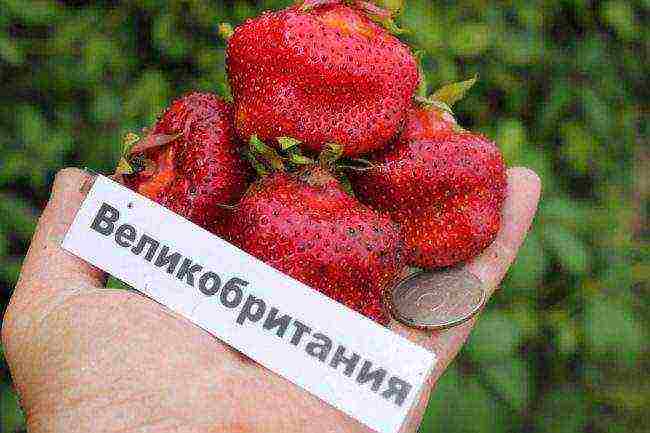
The variety immediately produces very large berries, even when planted in spring.
This is a new variety that is loved by many gardeners due to its high yield. See the plate for details on strawberries.
| Term | Medium late. |
| Berry shape | Rounded conical, fairly flat. There are no decorative berries. |
| Berry weight | 40-100 grams. |
| Berry color | Dark cherry. |
| Bushes | Very powerful. |
| Taste | Juicy, sweet, there are subtle notes of strawberries. |
| Transportability | Quite high. |
| Frost resistance | Up to -15 degrees. |
| Disease resistance | With proper care, it is quite high. |
| Productivity from 1 bush | More than 2000 grams. |
Strawberry Great Britain is a confident leader among super large-fruited varieties.
Features of the Marshal variety
Also referred to as "titanium" grades.
| Term | Medium ripening. |
| Berry weight | Up to 80 grams. |
| Berry color | Intense, red. |
| Taste | Sweet, very juicy. |
| Bushes | Quite powerful, spreading. |
| Foliage | Large, shade - bright green. |
| Frost resistance | Up to -15 degrees. |
| Pest and disease resistance | High. |
| When ripe | In the 1st decade of June. |
Conclusion
Each of the large-fruited strawberry varieties has its own charm. They are all suitable for growing in domestic conditions.
Video about planting large-fruited strawberries

